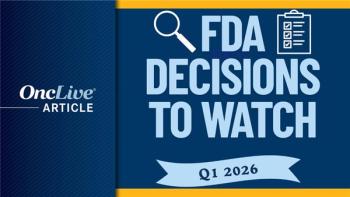
NTRK Gene Fusions in Solid Tumor Malignancies
Transcript:
Benjamin P. Levy, MD: For the sake of time, let’s move on to TRK physiology, and specifically NTRK alterations and which ones are truly targetable or not. Interestingly enough, the whole NTRK story starts in 1982 with the identification of the mutation in colon cancer. And then the physiology gets sorted out there afterward, which is kind of reversed in a lot of the ways.
But if we look, I think it’s important to set some context with TRK physiology, only because it will dovetail into the toxicity assessments of these drugs—these on-target toxicities. TRK pathways are found in embryonic development, in neural development. I say that only because we’ll start talking about some of the on-target effects of these drugs as they relate to proprioception and dizziness and things that we can see with these drugs once you inhibit the TRK pathway.
But let’s move on to the NTRK gene fusions and where they’re found, and then we can talk about which mutations are predictive of response to these drugs or not. John, can you just give us a high-level overview of NTRK fusions in solid tumor malignancies?
John L. Marshall, MD: I like to think of it like Willy Wonka and the golden ticket, right? The chocolate bars kind of look alike, and you have to keep opening them up until you find 1 that has it. They’re seen across a bunch of different kinds of cancers. There isn’t any cancer for which we’ve yet said, “No, it’s not going to happen.” So that’s tricky, in some ways. It doesn’t narrow our field. There are some more common ones—secretory breast or thyroid tumors. There are some pediatric tumors that are a little bit more common. But in our common malignancies, what’s the lung number? Is it under 1%?
Benjamin P. Levy, MD: Less than 1%. It’s 0.2%.
John L. Marshall, MD: The numbers are in the under 1% range, but they’re real. We all have seen them. We’ve all identified patients who have them. And when you look across the whole spectrum, it’s rare, to the point that many physicians out there may never find 1. They may never win the lottery. They may never find the golden ticket. But there are enough of them out there, over the course of your career, so you probably will, if you start looking and looking correctly. There are certain cancers for which I think there is a higher probability.
For example, in MSI [microsatellite instability] tumors, MSI colon cancers particularly, almost all the NTRK fusions are found in that group. So if you have an MSS [microsatellite stable] colon cancer, it’s even rarer. Then that of course brings up the tricky situation of: what if you have both MSI and NTRK in the same patient? But that may kind of make sense why that would be in an MSI-high case, because of the genetic abnormalities that are underpinning both. So it’s rare. There are certain cancers for which it’s a little bit more common, but no cancer yet is sort of out there where we just decide not to check for it.
Benjamin P. Levy, MD: Yeah. Well said. We have these rare tumors for which NTRK fusions are highly enriched, and then we have the common tumors—colorectal, pancreatic, lung, sarcoma, head, and neck—where it’s less than 1% or less than 5%. But as you said, once you find it, to be able to act on it is something that we’re all trying to do across all our tumor types, delivering precision medicine.
Transcript Edited for Clarity



































